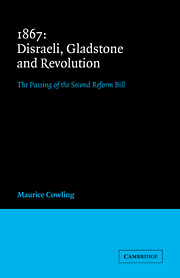Book contents
- Frontmatter
- Contents
- Preface
- Dedication
- Introduction
- I Prelude
- II Preliminary: The uprooting of the Whigs
- III The cornering of the Conservative party
- IV The reassertion of Conservative policy
- V The destruction of Liberal unity
- VI The victory of Disraeli
- VII The public agitation
- VIII The acceptance of Hodgkinson's amendment
- IX Conclusion: Palmerston's mantle
- Epilogue: The limitations of historical knowledge
- Appendixes
- Bibliography
- Notes
- Index
Introduction
Published online by Cambridge University Press: 18 December 2009
- Frontmatter
- Contents
- Preface
- Dedication
- Introduction
- I Prelude
- II Preliminary: The uprooting of the Whigs
- III The cornering of the Conservative party
- IV The reassertion of Conservative policy
- V The destruction of Liberal unity
- VI The victory of Disraeli
- VII The public agitation
- VIII The acceptance of Hodgkinson's amendment
- IX Conclusion: Palmerston's mantle
- Epilogue: The limitations of historical knowledge
- Appendixes
- Bibliography
- Notes
- Index
Summary
The understanding of mid-Victorian politics which the pre-war generation of historians transmitted to its successors has, over the last twenty years, been subjected to extensive emendation. A period of psephological and sociological analysis has established the received fact that nineteenth-century political society was more aristocratic than earlier historians had been willing to admit, and its politics socially more conservative than they had tended to suppose. In a society of great fortunes, many of them new and some politically unrewarded, the ethos of political deference, the strength of executive government and the concern felt by owners of even new wealth for their continued possession of it have been given their place in the still-life picture which historians present. The farther away 1860 recedes in time, the less volatile and radical the structure seems to become.
Yet, though these truths are understood by every student of the period, they have left virtually no mark on the accounts which have been given of the process by which political decisions were made. Most full-scale published accounts of the major political decisions taken in England between 1846 and 1880 were written in the late nineteenth century or early twentieth, or, if written later, take at its face value the structure of interpretation in which, for example, Molesworth, Trevelyan, Justin McCarthy and Herbert Paul put them. They assume that Radicalism was more powerful, the gentry weaker and middle-class politics uniformly more progressive than sociological analysis might suggest, and they fail, where they try, to understand the conservative character of the politics they were attempting to describe. They see mid-Victorian parliamentary politics as Liberal politics.
- Type
- Chapter
- Information
- 1867 Disraeli, Gladstone and RevolutionThe Passing of the Second Reform Bill, pp. 1 - 7Publisher: Cambridge University PressPrint publication year: 1967

